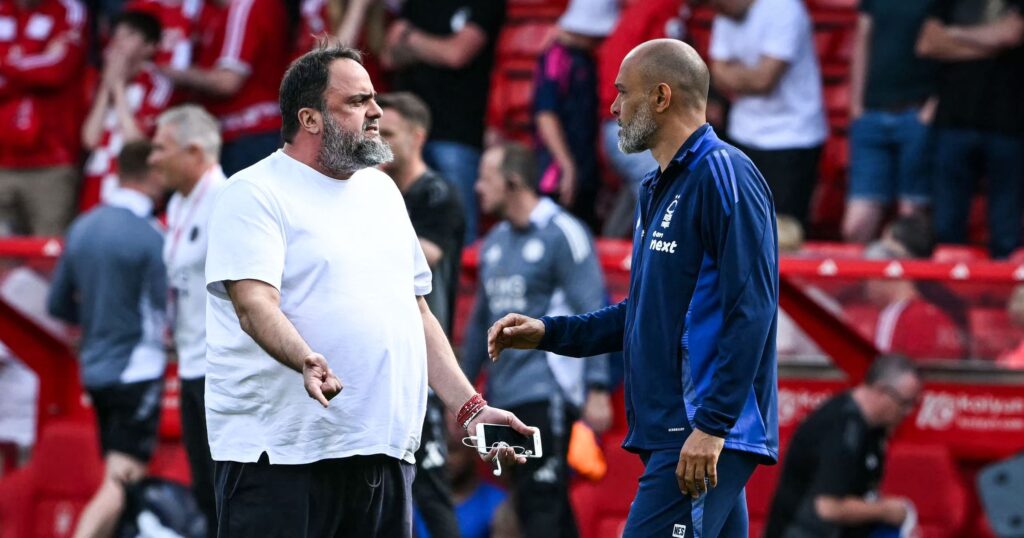Nottingham Forest has recently found itself entangled in controversy surrounding an incident that occurred during their 2-2 draw against Leicester City in the Premier League. The situation primarily involved their manager, Nuno Espirito Santo, and club owner, Evangelos Marinakis. In light of the ensuing media frenzy, the club has openly refuted the depiction of the interaction as a confrontation, labeling the coverage as “fake news”. Through a statement posted on their official website, they clarified the sequence of events, attributing the emotions that unfolded to the unfortunate situation surrounding striker Taiwo Awoniyi, who sustained a serious abdominal injury during the match.
Awoniyi’s injury occurred during the closing moments of the game. He collided forcefully with the post, prompting immediate medical attention on the field. Interestingly, Forest had already exhausted their three substitution opportunities, which meant that the 27-year-old was compelled to continue despite clearly displaying signs of distress. This led to heightened frustrations within the club, particularly among the management and ownership. The club stated that their principal concern was for the welfare of players and emphasised that the medical team’s decision to allow Awoniyi to play on was not acceptable. This level of frustration underscored the club’s insistence that the incident was a shared concern rather than a confrontation.
In response to the backlash regarding Marinakis’s reaction on the pitch, Nottingham Forest was keen to emphasize that his emotions stemmed from sincere concern and a sense of responsibility. They elaborated on Marinakis’s perspective: “To Evangelos Marinakis, this isn’t just a football club — it’s family.” The statement encapsulated the club’s ethos and culture, projecting the idea that unity and care for one another are paramount. The narrative sought to reframe Marinakis’s decision to intervene as not just an emotional one, but as an instinctive demonstration of leadership during a difficult moment for the team.
The unfolding of events at the City Ground highlighted how quickly misunderstandings can escalate. Notably, several commentators and former professional footballers, including Gary Neville, expressed discontent regarding Marinakis’s actions, labeling his behaviour as “scandalous.” Neville took to social media to assert that Nuno should negotiate his exit from the club, suggesting that both the players and supporters deserve better treatment than what they witnessed in that moment. This reaction from Neville and others only intensified the already swirling narrative around the situation, feeding into the perception of a contentious clash between coaching staff and ownership.
In their defense of the owner, Nottingham Forest reiterated their belief that mental and physical well-being should take precedence over media-driven narratives. They condemned the highly charged reactions and outrage from some sections of the public as being “baseless and ill-informed.” The club made clear their commitment to prioritizing the health of their players and coaching staff, suggesting that they would rather disregard external criticisms than compromise on those values.
The incident not only sparked discussions around player safety and medical protocols within football but also shone a light on the intricate relationships between club ownership and management. It exemplified how actions taken in the heat of the moment can be misinterpreted and contribute to a wider narrative in the media. Nottingham Forest now stands resolute in protecting its image, seeking to clarify misunderstandings while fostering a culture of care and responsibility that reflects their values towards their players.
As the dust begins to settle, many will be watching to see how the incident influences Nottingham Forest’s relationships going forward, both on and off the pitch, in a league that often sees emotions run high and narratives twist quickly.



